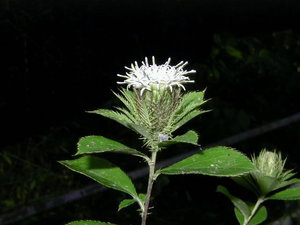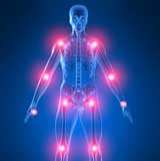
Pinyin: Bai Zhu Latin: Atractylodis Macrocephalae Rhizoma (Alba)
Physical Characteristics
Atractylodis Macrocephalae Rhizoma (Alba) is a perennial growing to 0.5m by 0.4m hardy to zone 6 in flower from July to August, and the seeds ripen from August to September. The Atractylodes (White) Rhizome flowers are dioecious (individual flowers are either male or female, but only one sex is to be found on any one plant so both male and female plants must be grown if seed is required) Atractylodes Alba prefers light (sandy), medium (loamy) and heavy (clay) soils and requires well-drained soil, prefers acid, neutral and basic (alkaline) soils, can grow in semi-shade (light woodland) or no shade and requires moist soil.
Family
Traditional Chinese Medicinal (TCM) Uses:*
Atractylodis Macrocephalae is Antibacterial; Diuretic; Sedative; Stomachic; Tonic.
Bai Zhu is widely used in traditional Chinese medicine[238].*
The Bai Zhu root contains an essential oil, glucoside and inulin[283] and is a bitter-sweet tonic herb that acts mainly upon the digestive system and strengthens the spleen[238, 254].*
Atractylodis Macrocephalae root is antibacterial, diuretic, hypoglycemic, sedative, stomachic and tonic[176, 238]. Bai Zhu is used in the treatment of poor appetite, dyspepsia, abdominal distension, chronic diarrhea, edema and spontaneous sweating[176].*
Atractylodis Alba is often used in conjunction with other herbs such as Codonopsis tangshen and Glycyrrhiza uralensis[238].*
Combined with Baical skullcap (Scutellaria baicalensis) Bai Zhu is used to prevent miscarriage[254]. The roots are harvested in the autumn and baked for use in tonics[238].*
References
- [176] Yeung. Him-Che.Handbook of Chinese Herbs and Formulas. Institute of Chinese Medicine, Los Angeles 1985
- [238] Bown. D.Encyclopaedia of Herbs and their Uses. Dorling Kindersley, London. 1995 ISBN 0-7513-020-31
- [254] Chevallier. A.The Encyclopedia of Medicinal Plants Dorling Kindersley. London 1996 ISBN 9-780751-303148
- [266] Flora of China 1994
- [283] Nguyen Van Dan & Doan Thi NhuMedicinal Plants in Vietnam World Health Organisation 1989 ISBN 92 9061 101 4
Source: Atractylodis Macrocephala Rhizoma Plants For A Future, England 1996-2008.
This work is licensed under a Creative Commons License.
Natural dietary supplements are designed to offer the body support to promote health, harmony, balance and overall well being.*

 Get Well Natural, LLC
Get Well Natural, LLC  Kidney Function & Regeneration Health
Kidney Function & Regeneration Health  Platelet & Blood Cell Health
Platelet & Blood Cell Health  Prostate, Flow & Function Health
Prostate, Flow & Function Health  General Mind & Body Health
General Mind & Body Health  Heart, Cholesterol & Cardio Health
Heart, Cholesterol & Cardio Health  Allergy-Free Body
Allergy-Free Body  Anxiety & Stress
Anxiety & Stress  Blood Platelet Counts & Function
Blood Platelet Counts & Function  Blood Pressure Health
Blood Pressure Health  Kidney Function Health
Kidney Function Health  Immune System Health & Balance
Immune System Health & Balance  Prostate & Urinary Health Function
Prostate & Urinary Health Function  Blood Sugar Balance
Blood Sugar Balance  Cardiovascular Heart Health
Cardiovascular Heart Health  Detoxification & Healthy Cells
Detoxification & Healthy Cells  Women's Health
Women's Health  Liver Regeneration
Liver Regeneration  Pain-Free Body
Pain-Free Body  Water & Air Filtration
Water & Air Filtration 


